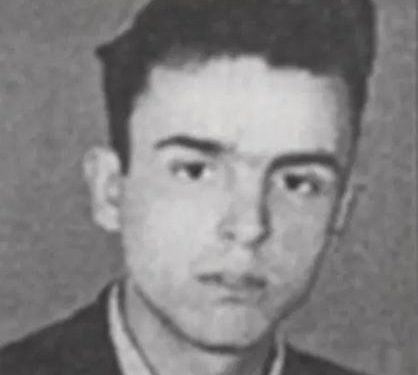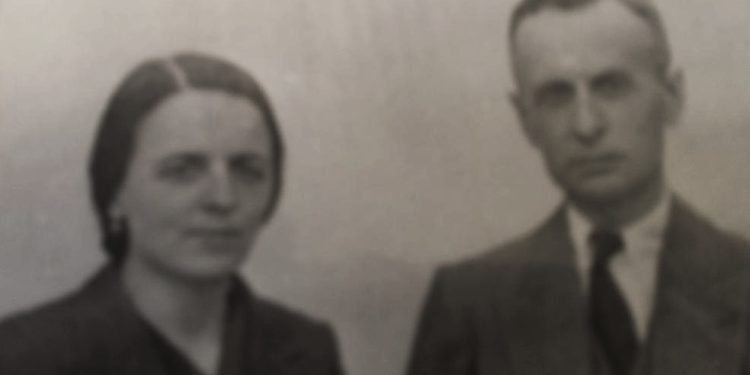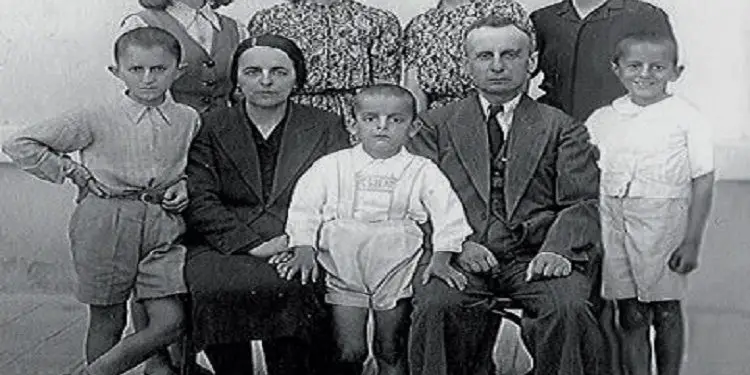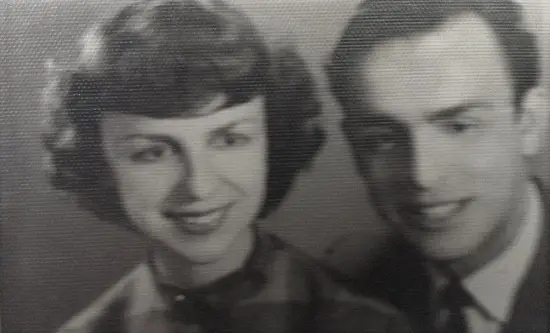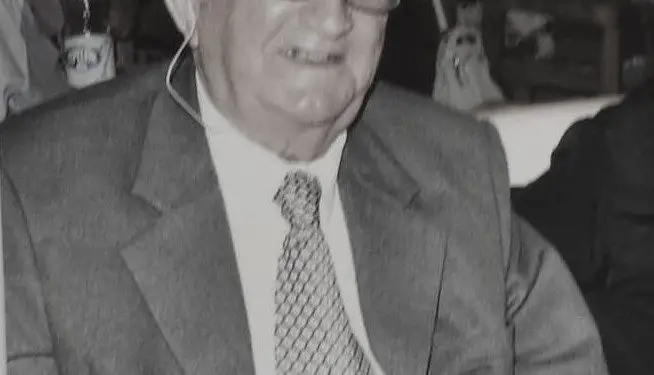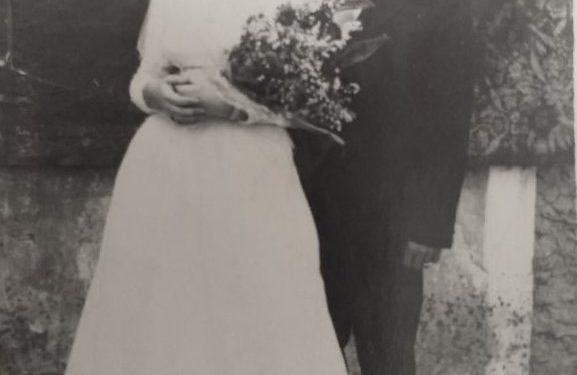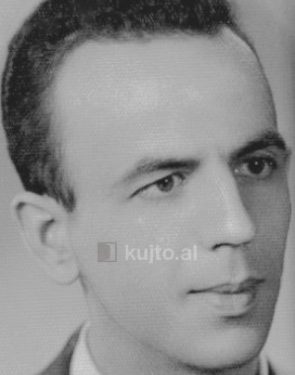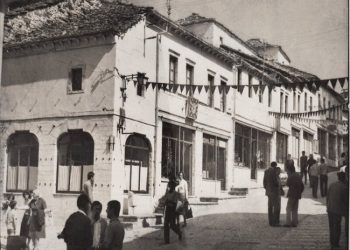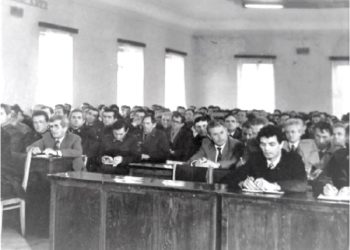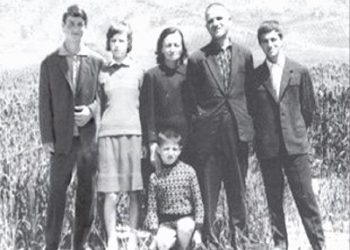By Reshat Kripa
The fourth part
Memorie.al / “Sometimes, when difficult trials fall on a child’s head from the tenderest age in the secret recesses of his soul, a kind of scale is born, a beautiful scale, with which he weighs the affairs of this world. Feeling himself innocent, he submitted to his fate without making a sound. I didn’t cry at all. He who has no reason to be scolded, does not scold others”!
(Viktor Hugo, “The Man Who Laughs”)
SHORTED YOUTH
Dedicated to family and society,
author
In the afternoons we went to the Pioneer House. I continued the circles of literature and theater. They were my two passions. I dreamed of becoming a writer and theater actor. The literature course was led by the well-known teacher, Eqerem Shijaku, who also taught us at school. It was wonderful. He had such a fluent language that, when he explained, all you had to do was open the books at home a little to learn. The theater course was led by Alipi Shtrepi, a friend of Fatushe’s, an actress in the amateur theater of Vlora. Fatushja also participated in this theater. She was among his best actresses.
In the Pioneer House, I also met other friends, such as; Pirro Doko and Nikollaq Vangjelin, who played the accordion, Luan Çipi, Qirjako Savë and especially, Myrteza Baboçin, one of our peers, who continued the seventh grade in school number one. He participated in the theater and music circles. He had a wonderful voice. He was the best singer of the group. He came from Gjirokastra. His father was a clerk. We became very close to each other. Although we were in different schools, we formed a sincere friendship. Perhaps we were bound more by our beliefs.
We often organized different shows that we gave for the people of Vlora or, in the surrounding areas, such as; in Selenica, Novosela, Himare and others. We had prepared several theatrical pieces, among which; “Timur and his friends”, by Arkadi Gajdar. I played the role of a member of a gangster gang. Also, a dramatization of the poem; “Soldier and death” by Aleksandr Tvardovski. The role of the soldier was played by Myrtezai, while the role of death was played by Mina Naqua. I played the role of the poet. We had also prepared two musical tableaus. One was titled; “Music Hour” and another one with a sports theme, whose title I don’t remember.
These paintings were written and composed by our outstanding music teacher, Tish Daija, who would later become a well-known composer. He had also composed some songs for children, which he taught us at school. Such were: “Kanga of frogs, Guli, guli, guli”, “Carambola”, “Little bird”, and others, which I have already forgotten. I still have sympathy for him even today. Tishi was also a good football player. He played as a center forward, with “Flamurtar”, from Vlora.
End of quiet days
The years 1949-1950 were difficult years for the country’s economy. Relations with Yugoslavia were severed. Those with the Soviet Union were not properly consolidated. Under these conditions, the state coffers had begun to empty. But the minds of our leaders came up with a refined method to accumulate money. This method was state foreign. All citizens who were working with the state were forced to buy a certain amount of bonds of this loan.
Its repayment would be done every month by lottery, for a period of twenty years. But, in reality, only a few were repaid in this way and, when this deadline was met, another initiative was invented, according to which, those that remained unpaid, were forgiven to the state, supposedly voluntarily. That’s how the little money the citizens had ended up in the state’s pocket.
We had father and Fatusha at work. Like everyone else, they were forced to buy a certain amount of bonds. But that was not enough. With a special decision of the District Executive Committee, all former traders were forced to buy a large amount of bonds. We were assigned to buy; 50,000 lek old bonds, an amount equal to two years’ salary of a worker at that time.
We were forced to sell even the few worn-out items we had left. But these were not enough. Then the father was forced to turn to some of his friends for help. They were willing. We were able to pay off these debts only after a few years, thanks to their generosity. That’s how we overcame this difficulty…!
April 15, 1950. My brother Besnik was preparing to go to a dance party organized by his class at school. He washed, cleaned himself, put on the brown suit that his father had given him, combed his hair and made himself well and beautiful, as if he was going to be a groom. He was a great skier. It was nice to see him when he left for the evening.
After dinner was over, I pulled myself aside and started reading a book. I had done the lessons in the afternoon. Once I felt my eyes were closing. I got up, said goodnight to the others and went to the bedroom. I fell into bed and immediately fell asleep.
Several hours had passed. I woke up. I noticed that the brothers’ and sister’s beds were undisturbed. I looked outside. She was just starting to agonize.
– “Where have they gone since morning”?! – I thought to myself.
Voices could be heard from the room below. I got dressed and went. Everyone was in the room except Besnik.
– “What happened”?! – I asked surprised.
– “Besnik, he didn’t come home last night”! – answered the sister.
My eyes went to the clock on the wall. It read 5.30.
– “Where should he be?! Dance nights don’t last that long”?!
No one answered. Dad walked around the room with his hands behind his back and talking to himself. Uncle, he tried to calm him down. The mother was huddled in a corner and crying silently.
– “Let’s wait a little longer and ask Lavdoshi” – said Agimi.
Lavdoshi was Beso’s close friend, along with Dino. We waited for an hour and Agimi left for there. Lavdoshi was very shocked when he found out what had happened.
– “I don’t know – he said – We were surprised that he didn’t come at all in the evening”.
We went through different variants in our minds, but none of them seemed possible. The character of Besnik, you had created this conviction for us. We didn’t go to school that day. I stood in silence and listened to the conversations that took place. I looked at my mother and sister who were crying silently and I don’t know why, I was covered in tears too.
– “Recently, secret tracts have started to be distributed at school. I have also read some of them. It has nothing to do with them”?! – asked Dawn.
We all looked at each other, but no one spoke. At this time, Çelo Banci, who lived in our house, entered the room. When he found out what had happened, he said:
– “Surely, there must be a woman in the middle”.
– “No, no!” I answered him. – I don’t have a son like that”!
Thus, anxiously waiting, that day passed. In the evening, knock on the gate. Two officers of the Internal Affairs Branch entered the room. Their presence disturbed us. They understood and one of them spoke:
– “Do not worry. We stopped Besnik to clarify something”.
– “What has he done”?! – asked the father.
– “Nothing. Last night he had a fight with a woman and she complained. So, we have to verify it. Now excuse us, but we have to check his books.”
In fact, they turned everything upside down. The books of Besnik, Fatushe, Agimi, mine, etazer and everything else. When they didn’t find anything, they took some of his notebooks. Before they left, the one who had spoken before said:
– “Do not worry. This work will end in two or three days”.
We felt somewhat calmer. At least now we knew where it was. The Father, as a great soothsayer, spoke:
– “Everything they said is nothing but nonsense. They were the same as what Çelua said. Tefta, who works in the Internal Branch, will probably have told him. She is friends with his maid. Dawn is right. The boy was separated from us. I don’t know where he will live, until I see him one more time”?!
For the first time, I saw tears in his eyes. He was fifty-eight years old. The successive blows of the past five years had worn out his heart. He needed that too. They all spoke to him, until he gathered himself.
After two days, we were told to take off our clothes. This confirmed the father’s words. Three weeks later, Lavdoshi and Dino were arrested. Now everything became clear. They were arrested for creating a clandestine organization, which distributed tracts with content against the government, in the school. Six months passed. The Gjirokastër Military Court sentenced him to twenty years in prison. They celebrated with Dino, from fifteen years. The Court of Appeal returned Besnik’s sentence to fifteen years.
The arrest and conviction of Besnik greatly influenced my formation. I had just turned fourteen. I was at an age where I could not understand who was right and who was wrong. However, the events of these last years had influenced the formation of my worldview. The killing of the boy in front of our house, the incident with the partisans for Dr. Kirčik during the Tirana war, Xhemil’s attitude towards me, the expulsion from Tirana and finally, the episode with teacher Kiço, had changed my character to a certain extent.
I was no longer that carefree boy who didn’t care what was going on around him, whose only goal was school and reaching the highest peaks. Another feeling was beginning to boil within me. It was the feeling of protest. She was just waiting for the spark to explode with all its force.
* * *
Three months later, the uncle remarried. He was obliged to do such an act. Only thirty-nine years old and with four children. The house felt the need of the woman. He married Zenepe, the daughter of the former merchant from Kruja, Sulejman Bedeni. The dealer found the dealer. Uncle and Qamila went to take Zenepe to Tirana.
They came by bus. Agimi was waiting for them at the agency, with a horse-drawn carriage. At the moment when she was entering the house, Fatbardha, the uncle’s eldest daughter, started crying loudly. She was seventeen years old and, probably, in those moments, she remembered her dead mother. Zenepja became a housewife. She took care of her husband and children.
In August, my father was fired. In the written motive it was said: – “You are fired from your job, due to the hostile activity against the People’s Power, of your son, Besnik Kripa”.
From that day, he did not go to work again. We were left with only Fatushe’s salary. We had to feed five of us and also keep Besnik in prison. To cope, we were forced to work on a small garden that we still had next to the plot, where the state had already built a new oil factory. There we planted different vegetables, which we used for ourselves. In addition, we also had the help of married sisters.
Drita, who had come to Vlora, proposed to my eti to take me to continue my schooling at the gymnasium in Tirana. In this way, one person is removed from the family members, who had to be fed. The father agreed. But, unfortunately for me, in the only high school in Tirana at that time, there were no more places. Only the pedagogical school remained. The father refused.
– “Why will all my children continue to Pedagogical school”?! he said.
Here he meant Liri, Drita and Fatusha, who had attended the same school. I was also glad that this did not happen. Such a thing would separate me from Neri. However, perhaps it would have been better if I had gone.
* * *
In September, I started the first grade at the “Ali Demi” gymnasium in Vlora. I was staying in a bank with Jorgo Beshon from Çatistra e Poliçani. He came from the number one school. We quickly formed friendships with each other. We were from different social strata. I, the merchant’s son, that son of a poor butcher. However, this was not a hindrance in our society. I was a good student, while Jorgua was of an average level.
We were in our youth. But to be admitted to her organization, a request had to be made. We made all the classes from one. The day the organization met to review the requests, we all gathered in front of the school. We were waiting for the results. The youth secretary came out to the entrance of the school and began to read the names of those who had been admitted. All the names of the class were read. Only my name was missing. They were the consequences of Besnik’s punishment. I felt myself very tight.
I left alone and was walking thinking. I heard them calling me. I turned my head and saw Jorgo with Myrteza
– “Don’t be upset”! – said Myrtezai.
– “Thank you”! – I told them. – For me, your company is precious”.
The next day at school, I was aloof. I was afraid that my friends would stay away from me. But it didn’t happen like that. Most of the class treated me the same as before. In particular, Donika, Aliqi, Neimeja, Myneverja, Ana, Vjoleta, Shazja, Zymbylja, Luani, Leka, Shezaiu, Minella, Spirua, Mihali, Zakua, Dhimitri, Nexhati, Ibrua and others stayed closer to me. Those days four girls; Vjoleta Muçua, Ana Papakosta, Shaze Xhindi and Zymbyle Hoxha, created a social group that we, starting from the four initials of their names, called “VASHZ”.
At the same time, we, four boys; Zenel Zeneli, Jorgo Beshua, Ali Zankua and I formed the group “ZJAR”. They were just children’s games, but it didn’t occur to me that just a few months later, together with Jorgo and Myrtezana, we would form a real group, which would become the reason for changing our lives.
Youthful vigor
End of February 1951. Sunday. Mother had prepared kullur, a kind of biscuits, which she made occasionally on her days off. That afternoon, we had left him to prepare the tasks, together with Jorgo. I took some sprouts, wrapped them in newspaper and left. When I went outside, as usual, my feet took me down Neri’s alley. I saw in the square the rest of the stairs, cleaning. She saw me too, but lowered her head and pretended not to see anything. I had decided to rent it out, but I didn’t dare to talk to him. I passed without speaking and went to Jorgo’s house. I also found Myrteza there.
I gave them the vegetables and then we opened the books. We started doing our homework. The lesson was not working for us. I had noticed that Jorgua had not been as usual for a few days. You can’t concentrate. He was distracted from everything.
– “Jorgo, you don’t look good to me today. What do you have”?! – I told.
– “It’s been three days since I lost my loaves of bread. We have nothing to eat at home. Haven’t you noticed that even at school I don’t pay attention to the lesson?!
– “Where did you lose them”? Myrtezai asked.
– “I do not know. I took the bread and returned home. There I saw that I didn’t have the stamps with me. That evening, my father beat me badly.”
– “Did you complain anywhere”?!
– “The father went to the trisketim office, but they received him with disdain”!
– “They didn’t think about what this family would live with”?!
A revolt broke out in our hearts. It had been building up for a long time and now it was time to explode. Each one of us began to express dissatisfaction against the government. They were the years of great clashes between values and anti-values. In these turbulent days a man, regardless of age, had to find himself.
– “I don’t know how I am these days”, – said Myrtezai. – I feel something inside myself.
I affirmed the same. So does Jorgua. The three of us were of one mind. We felt we had to do something. But what?
– “I think we should create an organization and distribute tracts in the city.” – I spoke.
Myrtezai, after thinking a little, began to tell us how two years ago, with some friends, they had formed such an organization and distributed tracts…! I remembered a poem that I had read in a tract of that time. It was dedicated to the two fallen, Hysen Sinani from Lepenica and Zagoll Shenaj, from Gjormi, who were killed in an effort with the Defense Forces. They made them bleed like that and threw them near the “Spear of the Flag”, in the square of the same name, to terrorize the population. I still remember some of the lines of that poem:
“You fell victim,
As men, as brave,
In heroic struggle,
With a Christian heart.
You two friends,
You fought earth,
You fought bravely,
For mother Albania.
You sons of Lepenica,
Dukat, Selenica,
Gjormi’s, keep it
Our Albania.
At the last minute,
With one voice you said,
Down who rules,
The tall people”.
– “I wrote that poem. I wrote it in many copies and we threw it in several places where people gathered, – continued Myrtezai. – I agree to create the organization”.
– “Me too” – said Jorgua.
The spark was lit. Protest sentiment was now expected to explode.
– “But first we have to swear. Wait for me here.”
I said and flew like the wind, home. I had seen that mother kept a national flag, without a star, on her chest. When I arrived there, Fatushja and Agimi were in the room upstairs. Mother was preparing dinner in the kitchen. Father hadn’t come yet. I went into the fire room, opened the chest, took the flag and wrapped it in newspaper. When I was leaving, my mother came and said:
– “Where are you going”?!
– “To Jorgua”.
I flew and, in the blink of an eye, I was at Jorgo’s house. We spread the flag on the table and I told my friends to place the palm of their right hand on the double-headed eagle. Memoria.al




